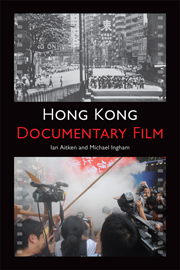Book contents
- Frontmatter
- Contents
- Introduction
- 1 Hong Kong, Britain, China: The Documentary Film, 1896–1941, A Page of History (1941) and The Battle of Shanghai (1937)
- 2 Hong Kong, Britain, China: The Documentary Film, 1947–69, the ‘Picturesque’ Committed Film and Water Comes over the Hills from the East (1965)
- 3 Colonial Film: The Development of Official Film–making in Hong Kong, 1945–73, the Hong Kong Film Unit (1959–73) and This is Hong Kong (1961)
- 4 Public-service Broadcasting in an Authoritarian Setting: The Case of Radio Television Hong Kong and the Development of Television Documentary Film in Hong Kong
- 5 The Documentary Films of Radio Television Hong Kong (RTHK) and The Hong Kong Case (1989)
- 6 Aesthetics and Radicalism: An Overview of Independent Documentary Film in Hong Kong, 1973–2013
- 7 A Critical Analysis of Significant Independent Documentary Films of the Past Three Decades
- Conclusions: The Future of Independent Documentary Film in Hong Kong, China and the Region
- Bibliography
- Index
3 - Colonial Film: The Development of Official Film–making in Hong Kong, 1945–73, the Hong Kong Film Unit (1959–73) and This is Hong Kong (1961)
Published online by Cambridge University Press: 05 September 2014
- Frontmatter
- Contents
- Introduction
- 1 Hong Kong, Britain, China: The Documentary Film, 1896–1941, A Page of History (1941) and The Battle of Shanghai (1937)
- 2 Hong Kong, Britain, China: The Documentary Film, 1947–69, the ‘Picturesque’ Committed Film and Water Comes over the Hills from the East (1965)
- 3 Colonial Film: The Development of Official Film–making in Hong Kong, 1945–73, the Hong Kong Film Unit (1959–73) and This is Hong Kong (1961)
- 4 Public-service Broadcasting in an Authoritarian Setting: The Case of Radio Television Hong Kong and the Development of Television Documentary Film in Hong Kong
- 5 The Documentary Films of Radio Television Hong Kong (RTHK) and The Hong Kong Case (1989)
- 6 Aesthetics and Radicalism: An Overview of Independent Documentary Film in Hong Kong, 1973–2013
- 7 A Critical Analysis of Significant Independent Documentary Films of the Past Three Decades
- Conclusions: The Future of Independent Documentary Film in Hong Kong, China and the Region
- Bibliography
- Index
Summary
Colonial film-making, in the guise of British official film-making, as opposed to the early entrepreneurial British/US/French film-making of the 1898– 1914 period, developed slowly in Hong Kong over the period from 1945 to the abolition of the Hong Kong Film Unit (HKFU) in 1973; and, in order to understand the reasons for that slow progression it will first be necessary to consider some problems and impediments that had already developed prior to and during the Second World War, problems which were related to an antagonism between a ‘Colonial Office’ (CO) and ‘Griersonian’ tradition. The term ‘Griersonian’ is often used as an abbreviation for the British documentary film movement of the 1930s and 1940s. There are problems associated with such abbreviation, principally, that the movement as a whole becomes subsumed under the name of its leader: John Grierson. Nevertheless, in order to be terminologically concise, and in the absence of suitable alternative terminology, the term ‘Griersonian’ will be employed here, but in a global sense, not to refer to matters very close to Grierson himself, but to the tradition of the British documentary film movement as a whole. Such employment is warranted here because this chapter is to a considerable extent concerned with an opposition between a general ‘Griersonian’ and ‘CO’ approach to official film-making. Put succinctly, if epigrammatically, the Griersonian approach involves making documentary films which attempt to advance the progress of democratic-liberal development across a broad filmic front, whilst the CO approach involves the production of much simpler films which make specific, pragmatic interventions, usually in order to consolidate a more conservative status quo.
- Type
- Chapter
- Information
- Hong Kong Documentary Film , pp. 71 - 101Publisher: Edinburgh University PressPrint publication year: 2014



